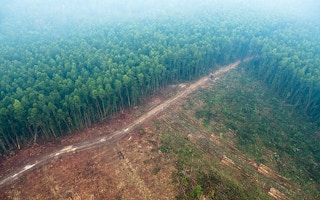Pulp and paper supplier PT Bumi Mekar Hijau has been declared guilty of causing fires in South Sumatra by an appeals court in the Indonesian province, reversing a decision that had been seen as a major setback to President Joko “Jokowi” Widodo’s campaign to prosecute fire-linked companies.
Smoke from the fires on land controlled by PT BMH contributed to last year’s air pollution crisis which sent toxic haze billowing across the region and sickened half a million people. The plantation company claims it did everything it could to fight the fires, and in December 2015 a district court accepted that argument even as the Environment and Forestry Ministry insisted the firm had been negligent in failing to prevent the burning and may even have manipulated the flames for its own gain.
Environmental campaigners welcomed the guilty verdict while also expressing disappointment over the 79 billion rupiah ($6 million) penalty that PT BMH was ordered to pay. The acacia grower had been sued by the government for more than 100 times that amount. The World Bank said last year’s fires alone cost Indonesia more than $16 billion.
“At the very least, the decision of the Palembang High Court is appreciated because it declares that PT BMH did commit an unlawful act related to forest fires,” said Hadi Jatmiko, head of the South Sumatra branch of the Indonesian Forum for the Environment (Walhi), a national NGO.
But he added that “in our opinion, the high court decision is insufficient in acting as a deterrent.”
PT BMH is a major supplier to Asia Pulp & Paper, Indonesia’s largest pulp and paper company. APP is an arm of the Sinar Mas conglomerate. On Monday foresthints.news reported that PT BMH too is owned by Sinar Mas, based on legal documents the plantation company had submitted to the environment ministry.
“
At the very least, the decision of the Palembang High Court is appreciated because it declares that PT BMH did commit an unlawful act related to forest fires.
Hadi Jatmiko, head, Indonesian Forum for the Environment (Walhi) South Sumatra
Asked if that was true, an APP spokesperson told Mongabay that PT BMH was neither a subsidiary of APP nor of Sinarmas Forestry. Ragil Utomo, the ministry’s dispute settlement director, said on Monday he could not confirm it either way.
Earlier in August, a district court in Jakarta declared PT National Sago Prima as guilty for allowing fires to burn on its concession in Riau province, ordering it to pay the equivalent to $76 million in fines and reparations, the highest penalty handed down in connection to the fires yet.
The annual fires are a result of slash-and-burn practices by companies and farmers aiming to clear their land cheaply for planting. Using fire to clear land is generally illegal, but oversight is poor and corruption is rife.
The problem is compounded because Indonesia’s vast peat swamp zones have been widely drained for large-scale agriculture, and the dried peat is highly flammable. Last year’s fires were especially devastating because of the extended dry season brought on by El Niño.
As a result of last year’s crisis, President Jokowi declared a moratorium on peatland development and on new permits to establish oil palm plantations. He also set up an agency to restore more than 2 million hectares of damaged peatlands.
This year’s fires are currently getting underway in Sumatra and Borneo, sending smoke into Singapore and Malaysia as well as making life difficult for Indonesians at home.
This story was published with permission from Mongabay.com

















